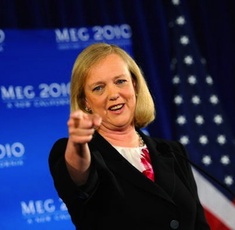
Meg Whitman will benefit from police PAC. (Getty Images)
As the leading self-financed candidate in U.S. history, billionaire Meg Whitman has doubled down on her fortune in the gubernatorial race with her Democratic rival, Attorney General Jerry Brown.
Given her vast wealth, last week's independent expenditure of $450,000 by a political action committee on behalf of Whitman-one of the first of its kind since the start of the campaign-was especially striking.
The money-from a group largely financed by Los Angeles law enforcement officers-came after Whitman carved out an exception for public safety workers in her plan to reform pensions. The infusion of money followed allegations that Whitman mistreated her longtime maid, an undocumented citizen, which thrust the former eBay chief executive into a defensive crouch in the second gubernatorial debate Saturday, adding another twist to the saga unfolding around this year's election.
Such an infusion of cash for a candidate who has spent $119 million of her own fortune raises questions, political experts say. A surfeit of unrestricted expenditures from special interest groups is pouring money into the midterm elections this year, recalibrating the nation's levers of power. Independent expenditure committees are exempt from campaign contribution limits, which for each gubernatorial candidate is $25,900 per election this year, making it difficult for voters to track who is influencing government.
"The fact that she is now getting independent expenditures from police after she carved them out as the exception looks suspiciously like a quid pro quo," said Bruce Cain, a political science professor at University of California Berkeley. "You have to ask why are they doing it? The only reason you would think is to get credit in their eyes. So she will feel obliged to pick up the phone once in office."
A central pillar of Whitman's campaign has been that her wealth insulates her from special interests. As part of her push for pension reform, she has, however, said she will make an exception in a two-tiered pension system for police, firefighters or other state law enforcement officers.
Whitman's spokesman, Darrel Ng, dismissed any suggestion that the independent expenditure would influence her policy decisions if elected. Moreover, Ng said that only some pensioners would continue to keep their defined benefits under Whitman's plan, such as workers retiring from the California Highway Patrol and CALFIRE, who negotiate their contracts with the state. Ng said it appeared that members of the independent expenditure group negotiated their pensions with city and county governments.
"These efforts are independent, so it's not something that the campaign pre-authorizes or knows about before they happen," said Darrel Ng, a spokesman for the Whitman campaign.
But a consultant for the PAC that made the expenditure--the California Law and Order Independent Expenditure Committee, said Whitman's proposal to exempt some law enforcement from pension cutbacks is one of the chief reasons they support her.
"That's a portion of it," said Don Novey, a consultant for the California Law and Order Independent Expenditure Committee. "Jerry Brown tried to bifurcate the pension system years ago. Whitman will try to maintain the present pension system, which enhances recruitment and retention."
Novey dismissed the notion that the committee's expenditure was timed to bolster Whitman's campaign at a potentially vulnerable point in the race.
The California Law and Order Independent Expenditure Committee was formed early this year when the Los Angeles Police Protective League and the Association for Los Angeles Deputy Sheriffs joined forces. The PAC spent $450,000 in support of Whitman on Sept. 29, campaign finance reports show.
Until Sept. 29, independent expenditures of $10,000 or more were generally the sole province of groups supporting Brown's cause. Roughly 20 committees, including labor unions and abortion-rights and other social issues groups, devoted their money to propping up Brown or knocking Whitman. More than $13 million in independent expenditures have gone to Brown's cause since the start of the general election.
The largest of those came from the California Working Families for Jerry Brown 2010, which spent more than $6.5 million.
While labor unions have lavished money on Brown's campaign, the former two-term governor says he will stand up to special interests if elected.
"After a summer in which Meg Whitman decried independent expenditures, it would be interesting to hear whether they also think this independent expenditure is the end of the universe," said Sterling Clifford, a spokesman for Brown. "He has always been independent-minded and stood up to powerful interests in his own party. As governor, he twice vetoed pay raises for employees."
Ng fired back, chastising Brown for his record on crime.
"It's obvious that public safety officers remember how soft on crime Jerry Brown was when he was first governor 30 years ago and this group wants to make sure it doesn't happen again," Ng said. "Jerry Brown has benefited from about $20 million in independent expenditures so far, the vast majority of which come from labor unions, which he could directly pay back if elected."











